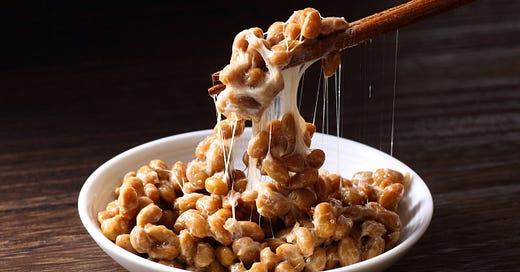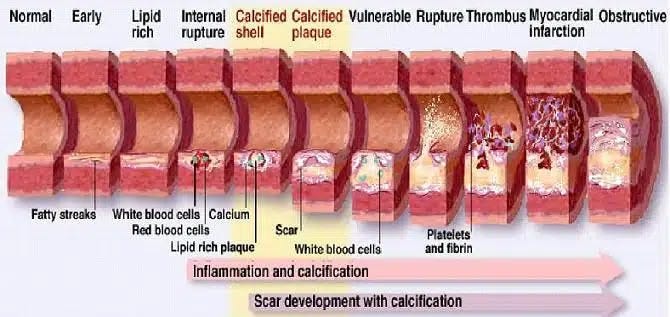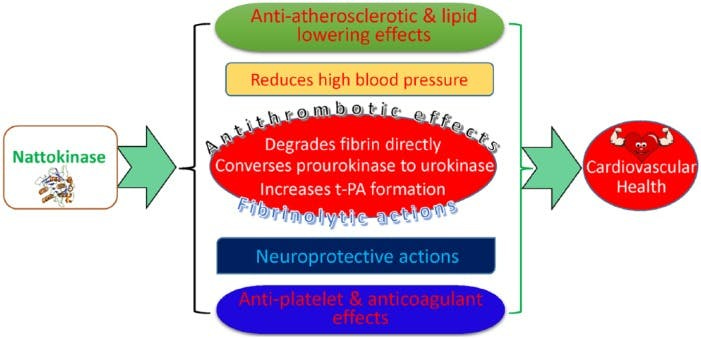Nattokinase, the Natural Statin Alternative
If you have elevated LDL levels, it is likely that you will be told to take a statin by your doctors. Some doctors might even advocate that EVERYONE should take them (I have seen a few cardiologist that recommend for everyone regardless of age who has elevated LDL).
Statins work by inhibiting an enzyme called HMG-CoA reductase, which plays a central role in the production of cholesterol in the liver. Cholesterol production declines, and LDL levels drop
Along with taking a statin, you'll probably be told to cut back on red meat, eggs and saturated fat.
This is the conventional view obviously.
And to the credit of statins, they DO work in lowering LDL levels.
But they have their own issues as well
What you are not told is that statins can have a multitude of side effects
Doctors will dismiss these as being rare, and statins are always said to be well tolerated. But statin side effects a common experience, and many people dont like taking them.
Common side effects:
- Muscle pain, aches, tenderness, or weakness
- Headaches -
Nausea
- Diarrhea or constipation
- Stomach pain or cramping
- Bloating or gas
- Dizziness
- Drowsiness
- Rash
- Sleep problems
Less common side effects:
- Liver inflammation
- Increased blood sugar levels or risk of type 2 diabetes
- Memory loss or confusion
- Neurological side effects like numbness or tingling sensations
-Hair loss
- Skin problems like acne
- Sexual problems (e.g., erectile dysfunction, decreased libido)
Rare but serious side effects:
- Myositis (muscle inflammation)
- Rhabdomyolysis (severe muscle damage that can lead to kidney failure)
- Liver damage
- Increased risk of bleeding
- Low blood platelet count
All this said, if you have high LDL levels and elevated ApoB, that is NOT a good thing, and you must do something about it.
Lifestyle changes we have already discussed, Im not going to rehash the importance of Diet, cardio, and exercise again and again.
Beyond the obvious, its worth asking if there are any supplements we take
There is ONE supplement that can decrease the risk of arterial plaque, and potentially even REDUCE existing plaque build up as well
That supplement is Nattokinase.
I first learned of Nattonkinase some years back from Dante Trudel, a bodybuilding guru who is known for his cutting edge research and recommendations (ive talked about him before, he is a Ghost mentor)
Nattokinase: A Promising Alternative in Prevention and Treatment of Cardiovascular Diseases
A natural supplement that prevent arterial plaque buildup AND reduce existing plaque?
That would be a miracle supplement if there ever was one. And Nattokinase may in fact be that powerful.
To preface everything Im about to share, I must remind everyone that the foundations of being Healthy are NOT going to come from taking a single supplement.
I am favorable to nattokinase, but it does not replace cardio and diet and exercise.
It also does not replace being an educated consumer and doing bloodwork and a CAC and an ApoB test and talking to a cardiologist and knowing all the relevant data about your heart health.
This is my "This is not medical advice" disclaimer.
Everything I am sharing is public information.
That aside, lets get into Nattokinase and learn about it.
To start with, WHAT IS IT?
Nattokinase is an enzyme that comes from the Japanese food known as Natto, which is fermented soybeans. The Japanese have been consuming Natto for about 900 years. The historical legend is that Prince Shotoku wrapped boiled soybeans in straw to later give his horse. After a few days the beans were opened, they had fermented, and in sampling some he realized they tasted good. And thus the practice spread of boiling soybeans, fermenting them, and that became Natto.
To be fair to the Chinese, they also consume fermented soybeans, but as the name Natto comes from Japan, we will give them credit.
If you are wondering right now, "why not just eat Natto?", I will tell you that Natto is infamous for being very slimy in texture, sticky, and having a pungent odor that many people find disgusting.
While its a popular breakfast food in Japan, many Japanese people hate it. Even there, its an acquired taste.
And unless you want to eat slimy, sticky, smelly soybeans every day, taking Nattokinase is your better option
Nattokinase is produced through the fermentation process
When beans undergo the process of fermentation and turn into Natto, there is a protease enzyme that is produced, the aforementioned Nattokinase.
The Japanese are a long lived people, with low rates of cardiovascular disease. As such, they have been studied for many decades, with attempts to elucidate their health and diet habits.
Natto has a reputation in Japan as being a Health food.
Subsequently, it was discovered in 1980 by Dr. Hiroyuki Sumi while working at the Chicago University Medical School. This discovery was not published until 1987 though.
His big discovery was that Nattokinase is a fibrinolytic enzyme, it prevents intravascular blood clots and breaks down clotting.
This was a big deal.
As Nattokinase was studied over the next 3 decades, more and more health benefits emerged. The first major identified benefit was the treatment of blood clots
Nattokinase is considered to be a safe, powerful, low cost, and all-natural supplement for the treatment of heart and cardiovascular disease [5,6,7].
Animal [3,4,8] and human trials [9,10,11] have demonstrated that NK provides support to the circulatory system by thinning the blood and dissolving blood clots.
When dogs were orally administered four NK capsules (2000 FU/capsule), chemically-induced thrombi in the major leg vein were completely dissolved within five hours and normal blood flood was restored [8].
A rat model of thrombosis in the common carotid artery also demonstrated that NK-treated rats recovered 62% of arterial blood flow.
NK exhibited considerably stronger thrombolytic activity than the fibrinogenolytic and fibrinolytic enzymes, plasmin, or elastase; which restored 15% and 0% of blood blow in the rat carotid artery, respectively
How does it work?
Nattokinase works in multiple ways.
The first is its a powerful fibrinolytic enzyme, meaning it can break down fibrin, which is a key component of blood clots.
This helps dissolve existing blood clots and prevent new ones from forming. But it does not stop there.
Nattokinase also inactivates plasminogen activator inhibitor-1 (PAI-1), which is a signaling protein that when elevated leads to blood clot formation.
This effect is very potent, and its why Nattokinase is categorized as a blood thinner.
But it does not end there
Further research demonstrated that nattokinase can reduce intimal thickening in arteries.
WOAH.
AJAC, I have no idea that means
So lets use a picture finally. I apologize for the low resolution.
Basically, the way heart disease develops, its goes in stages
First, your arteries start to get some sticky lipids deposited on them.
Then the walls of the arteries, they start to get thicker.
This is actually measurable, its called Intima Media Wall thickness. Its a test you can get
Over time, this wall thickening increases. Eventually it can progress to inflammation, then calcium deposits, scarification, more plaque buildup, arterial narrowing, blood clots, and then eventually a heart attack.
You DO NOT want your arterial walls thickening, nor do you want plaque build-up.
Enter in Nattokinase. Its not only has fibrinolytic properties which prevent blood clots, but it also seems to have an ability to reduce intimal thickening.
Hypothetically, consuming nattokinase your entire life would reduce your risk of heart disease because you are constantly cleaning out your arteries
AND THERES EVEN MORE
Nattokinase in the research is shown to halt the progression of atherosclerosis in humans.
In a recent clinical study conducted in our laboratory,9 daily NK supplementation was an effective way to suppress the progression of atherosclerosis in patients with atherosclerotic plaques. Following NK treatment for 26 weeks, there was a significant reduction in CCA intima-media thickness (CCA-IMT) and carotid plaque size when compared with the baseline before treatment
That is a BIG deal.
That means its preventing new plaque from forming.
THERES MORE DAMNT
Arterial thickening and plaque deposition has generally been considered irreversible and requires surgery (bypass surgery).
But based on the research, this study along with others is evidence suggesting that nattokinase may help reduce arterial plaque buildup and potentially reverse atherosclerosis to some degree.
WOW, what a great supplement for heart health.
And were not done yet.
Nattokinase also reduces blood pressure
In 2008, Kim et al8 conducted the first randomised double-blinded placebo-controlled trial to investigate the effects of NK supplementation on BP in prehypertension or stage 1 hypertension subjects. Oral administration of NK for 8 weeks resulted in a reduction of both systolic and diastolic BP (net changes were −5.55 and −2.84 mm Hg, respectively, P < .05)
It also looks to be as effective (and safer) than taking aspirin to prevent heart attacks and strokes
Low-dose aspirin (85-100 mg daily), as a potent anticoagulant agent, is widely used for the prevention of heart attacks, stroke, and atherothrombotic diseases. Aspirin exerts its antiplatelet action by inhibiting cyclooxygenase (COX) and subsequently reducing the synthesis of thrombogenic thromboxane A2 (TXA2) in platelets. However, the long-term use of aspirin comes with serious gastrointestinal (GI) side effects and bleeding.49 In a study comparing the antiplatelet effects of NK and aspirin, NK was shown to display excellent antiplatelet aggregation and antithrombotic activities in vitro and in vivo, inhibiting thromboxane B2 formation from collagen-activated platelets.12 Wang et al50 found that NK decreased fibrinogen levels in a cerebral ischaemic model and concluded that this was mediated by a pathway similar to that of aspirin. Natto showed an excellent inhibitory effect on platelet aggregation induced by adenosine 5ʹ diphosphate and collagen.25 In addition, NK was found to have positive in vitro haemorheological effects by decreasing red blood cell aggregation and low-shear viscosity.51
All the above data suggest that NK could be a good candidate, without any obvious adverse effects, for the improvement of blood flow and possibly superior to aspirin.
AND HEY, its even Neuroprotective for the brain in preventing neurological disease
Nattokinase is capable of degrading amyloid fibrils at neutral pH and normal body temperature, suggesting a role in the treatment of amyloid-related diseases such as Alzheimer disease (AD)
WOWZAS, its good for sinus health as well!
NK was recently demonstrated to effectively reduce nasal polyp tissue through fibrin degradation,69 indicating its potential in the treatment of chronic rhinosinusitis
But in the words of the legendary Billy Mays, BUT WAIT THERES MORE
And finally, its lowers LDL, raises HDL, and theres a possibility it improves lipid levels as well
Nattokinase as it turns out has five distinct benefits for cardiovascular health
This is why Nattokinase gets called a "wonder supplement".
We have a naturally occurring enzyme found in food, thats been consumed for millennia. It reduces the risk of plaque build up, blood clots, literallycleans your blood of bad stuff, lowers blood pressure, reduces probability of heart diseaseand heart attacks and strokes and alzheimers and sinus congestion.
Surely it might have some terrible side effects though???
NOPE.
Nattokinase was found to be nonmutagenic and nonclastogenic in vitro, and no adverse effects were observed in 28-day and 90-day subchronic toxicity studies conducted in rats at doses up to 1000 mg/kg/day, which is 100 times higher than the usual dose used in humans. In human volunteers, no adverse effects were observed following 4 weeks of NK consumption at a daily dose of 10 mg/kg for 28 days.61
No sign of toxicity was observed in the Ames test, the bone marrow cell micronucleus tests, or the mouse sperm abnormality tests following NK treatment. In an acute toxicology study conducted by Fu et al,62 no sign of toxicity was observed at daily doses of NK of up to 4 g/kg for a period of 30 days. All these data collectively confirm NK to be a safe product with very little or no toxicologic concerns.
The one side effect to Nattokinase is that it is a potent blood thinner, and for people with heart disease on multiple drugs, that might be a problem
There is one report of a patient concurrently using aspirin and NK (400 mg daily), experiencing an acute cerebellar haemorrhage.65
In addition, multiple microbleeds were demonstrated on brain magnetic resonance images suggesting that NK may increase risk of intracerebral haemorrhage in patients who have bleeding-prone cerebral microangiopathy and are taking aspirin concurrently.65
In another report, a patient developed a thrombus in a mechanical valve after nearly a year of NK use without warfarin and underwent a successful repeat valve replacement.66
Use of multiple drugs concurrently is common in patients with CVD. Therefore, it is particularly important to elucidate the potential possible interactions of NK with other drugs acting on the cardiovascular system.
So DO talk to your doctor if you are in a polypharmacy situation and have atherosclerosis already
Again, it also not a panacea that will fix a dumpster fire lifestyle.
If you are fat and dont exercise, and mainline sugar into your veins...what else do I need to tell you?
There is no supplement in a bottle that solves a mindbody disease of the mind.
And for the room temperature IQ people, this also does not mean that you get a bottle of natto capules and slam the whole thing
Dont be stupid on purpose. The point is that its a naturally occurring enzyme found in soy beans, its safe to consume, and it has major cardiovascular benefits.
You have TWO choices with Nattokinase
1. You could start eating Natto every day
Which as mentioned before, its not practical.
2. You can supplement with Nattokinase
Which brings to the question of DOSAGE
NK is measured in Fibrolytic units, FUs for short
2000fus of nattokinase equals about 100mg.
In the human trials, the effective dose appears to be somwhere between 4,000-12,000FUs.
So about 200-600mg.
Is higher better?
According to the most current research reviews, the understanding of the pharmacokinetics of how Nattokinase is not clear. Meaning the absorption process of how exactly it gets digested and ends up in the blood...we dont exactly know. We know that it DOES, but the specific mechanisms of where its being absorbed and how, that is still a question mark.
That said, the oral bioavailability of NK is estimated to be low.
The most recent human trials that show NK working have used higher doses.
This one was published in 2022
In conclusion, our data demonstrate that atherosclerosis progression and hyperlipidemia can be effectively managed with NK at a dose of 10800 FU/day. The lower dose of 3600 FU per day is ineffective. The dose of 10800 FU/day is safe and well tolerated. Some lifestyle factors and the coadministration of vitamin K2 and aspirin lead to improved outcomes in the use of NK. Our findings provide clinical evidence on the effective dose of NK in the management of cardiovascular disease and challenge the recommended dose of 2000 FU per day.
So how much should you take daily?
My conjecture is that based on the research, NK is dose dependent. You need to take a certain amount to have an effect.
How much? Somewhere between 6,000-12000fus (if you round up from 10,800).
Personally, I take 10-12k fus daily.
Usually divided into two doses, more and evening.
I take it with food (most supplements are absorbed best with a meal)
Where Can You Buy It?
Obviously amazon sells it. Go with whatever brand you trust there. The one I settled on was Double Wood. Their price was reasonable and they had good reviews
buy it direct from Double Wood.
I found this company (they are Philadelphia based) earlier this year when I was in New Jersey. It was founded by two brothers and the company specializes in nutraceuticals and more obscure supplements.
In Closing, Your Health is Your Experiment
Anecdotes are the mother of data. I believe NK is a long term supplement. It can treat acute issues, but it also has value as a preventative measure.
Take bloodwork now, and then again in 3 months, see what it does for you.
Im always open to changing my mind, but I think Nattokinase will prove itself to be one of the more useful nutraceuticals by the end of this decade.






